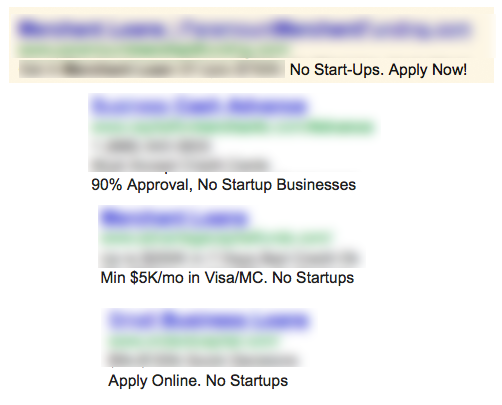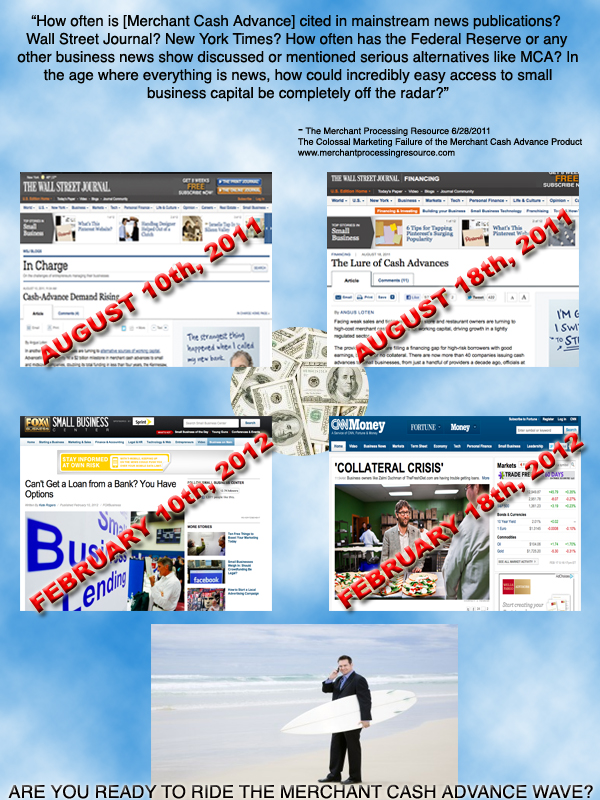Loans
The American Obsession With Startups
June 20, 2012Hi, I was just driving down 3rd Street and I saw an old building that had a For Sale sign on it. So I was just thinking it would be a great place to open a restaurant. It would have a really big outdoor eating area and I’ve always dreamed of owning my own restaurant. Lord knows I love food. I can’t talk long but I Googled loans on the Internet and you guys came up so I wanted to know if I could get a $4 million loan or line of credit to buy the building, fix it up, and make it into a Mexican restaurant, or maybe even Italian! Is that something you could do? I would need the money by friday…
This is the real transcript of a call to a Merchant Cash Advance brokerage. Don’t let anyone tell you that the U.S. is not a capitalistic society. Opportunity and entrepreneurship is so ingrained into the very fabric of our being that even self-proclaimed communists and socialists cast away their utopian worker ideals for the chance and self-satisfaction of turning something small into something big. We’re also an impulsive society, a trait partially due to our obsession with immediate self-gratification, but more to do with the fact that opportunities come and go in the blink of an eye. It is for these reasons that an individual who was taught to do market research, create a business plan, and mull things over is instead flying down the road with one hand on the wheel while the other hand is furiously applying for a $4 million loan to finance an opportunity he thought up 7 seconds ago.
How many other people driving down this road thought the same thing? How many of them have access to that kind of capital? Some might and so for the ones that don’t, the fear that someone is going to beat them to it turns them into unrealistic cash demanding lunatics. It’s true. The full service Merchant Cash Advance shops should probably offer John (the name we’re going to assign to the guy driving down the road) a proposal to help him create a business plan, form an LLC, and obtain the necessary licenses. These services would come with a price, a price that many people like John misinterpret as obstacles to be handled once he’s received the $4 Million. As John continues driving down the road, the dream of starting a restaurant is repeatedly crushed as he makes phone call after phone call to business lenders he found on the Internet. “There’s just no help for startups,” he concludes, and decides to hold off until the economy gets better before giving it another shot.
For 37 minutes that day, John was one of the many millions of startup businesses searching for capital. For the Merchant Cash Advance brokerage, he may have been one of the few hundred phone calls an account rep was bogged down with, while trying to help businesses that have been open for at least 1 year. The account reps have probably heard it all. “I want to start a home-based gas station“, “I need twenty million dollars for a good idea that I can’t tell you what it is because I don’t want anyone to steal the idea“, “I just got an LLC and I need $100,000 to come up with some business ideas“, “I’m gonna start an online shoe store and I need money to buy my first computer so I can get on the Internet.” We’re not poking fun at entrepreneurs since there are plenty of those who are really serious. But for the millions that call first and think second, they’re creating a disease unique to the U.S. It’s called startup fatigue. Business lenders are losing so much money by just talking to non-business owners, that they’ve taken to putting up big signs to ward them off.

The Internet is a great example because the cost of one click to the lender’s website can reach as high as $20. So how then does one tactfully express that their financing programs are for existing businesses only? It’s an art form that many have difficulty mastering. Advertisements, which are usually created to rope people in are instead being crafted to keep people out. “Hey Startups, GET OUT AND STAY OUT!” is the marketing campaign some lenders might be considering rolling out next quarter.

We expect that at this point in our post, startup specialists have already stopped reading and have instead taken to writing us long e-mails explaining how ignorant we are.
“DEAR MPR,
You are dumb. There are tons of startup lenders out there just begging for business.”
We’ll welcome any e-mails like this. Maybe these companies will stop hiding in the shadows and we can finally start helping people.
Raharney Capital, the organization that owns Merchant Processing Resource has a division that connects existing small businesses with financing companies. Coincidentally, they encounter a lot of pre-operational startups and continuously face the dilemma of how to service them.
Their first attempt to refer them out was with Go Big Network, a gargantuan networking service specifically for startups to obtain capital. Their homepage touts:
We help entrepreneurs find funding.
Over 300,000 Startups Have Used Go BIG to Connection with Millions of Dollars in Funding. Join today to connect with our network of over 20,000 investors.
They’ve been around for years and their advertisements can be seen all over the web. Inquiries about referring startups to them for a fee went nowhere as Go Big Network made abundantly clear that they did not want affiliates. Further attempts to refer them the business (even free of charge) went unanswered. It seems that even the startup masters don’t want to deal with more startups.
So we took to LinkedIn discussion groups and replied to the many individuals claiming to be angel investors or startup lenders. All of them backtracked on their original statements, with most eventually revealing that they were really looking for businesses that have been operating two years with positive cash flow. Are they liars? Not really. A young business is technically still a startup. What we did find though is that some Merchant Cash Advance providers are funding businesses that have been open for as little as three months. Not bad! (Check out: Capital Stack, Yellowstone Capital, United Capital Source, and Merchant Cash and Capital)
We thought we struck gold when we joined Startup Specialists, expecting to find lenders swarming the discussions with startup lending spam. Instead, we found no mention of financing at all. Interestingly though, this group was abuzz with activity. Thought you were cool because your post got 1 thumbs up? Thought that nothing was happening on LinkedIn? Some posts in this group are receiving hundreds or THOUSANDS of engaging, thoughtful responses! Sadly, no one seems to know where the money is, but that doesn’t seem to matter to them.
While writing this, our own inbox has grown considerably bigger and our voicemail box more full. Many are reaching out to us with questions about startup financing. The fatigue is slowly starting to set in.
One is a voicemail from Google, asking us to reactivate our Adwords campaign, something this site experimented with in the past with $100 in free ad credits. In their message, the account rep mentions that they have reviewed our site and can help startup lenders like ourselves create successful ads(what gave them this impression?). In startup-obsessed America, a stable, sustainable, and somewhat aged business is a mythical beast. Even Google has somehow mistaken our small business information site to be startup information. Too many people assume that small business means the act of trying to start a business. “Do You Have An Existing Business?” a bank advertisement might ask. Tons of people who don’t will still answer ‘yes‘ simply because the idea exists in their mind. It’s a beautiful thing in America to think that way, but getting off the ground and generating revenue shouldn’t be like winning the lottery, a game that you’ll never win but is fun to dream about.
We have interviewed writers for our site, some for volunteer positions, others to be paid. While instructing them to use small business as the subject matter, almost all of them revert to writing about starting a business. Marketing companies have also made the same mistake by pitching us their proposal to make cool videos for the site and then go on to create a demo video that talks about starting a business. One company actually asked us to provide a script and still they CHANGED IT to talk about how Merchant Processing Resource is a premier helper of startups. WHAT?!!!
By now, we’re running a high fever and the doctors suspect we have startup fatigue. Eleven more people have left voicemails, to request $300, $10,000, or $100,000,000 because they have this really sweet idea to make a restaurant named Chesster’s, (Chester’s with a double ‘s’) because each dining table will have a chessboard on it with chess pieces. Boo ya!! They haven’t worked out all the details yet but they thought the name was brilliant and oh yea… they need the money by tomorrow.
We’ll refer them to SCORE, a nonprofit association dedicated to helping small businesses get off the ground, grow and achieve their goals through education and mentorship. They may not get financing, but they will get HELP. And that’s really what Americans need. There isn’t a lending problem, there’s a helping problem.
Entrepreneurs like Mark Zuckerberg made it tougher for all of us. His progression went from random idea to scooping up cash from a classmate, to billionaire CEO of a publicly traded empire. He didn’t sit down with a SCORE mentor, do market research, and consult with a lawyer about how best to structure an organization. These are things he would have considered as obstacles to achieving his dream before someone else beat him to it. “I need the money by friday because this is going to be big,” Zuckerberg might have told a Merchant Cash Advance account rep who had heard the same story 97 times that morning alone.
Zuckerberg’s whirlwind success story portrays him as a role model genius, a boy who acted and capitalized on the split second window of opportunity while all the pieces fell into place after the fact. The rest of America so badly wants to replicate that. Too many people envision themselves in an interview with a New York Times reporter two years from now to talk about how they were driving down 3rd Street and the idea of starting a home-based gas station just popped into their heads, prompting them to Google business loans, and the rest of their billion dollar story is history. Similarly, when that doesn’t happen, just as many people chalk up their failure to a bad economy, Obama’s unwillingness to help, or the big bad banks indifference to the little guy.
It’s okay to go slow and get your ducks in a row. Hell, doing it this way is probably more honorable than what Zuckerberg did. You don’t need the funds by tomorrow, friday, or even next week. What you need is proof that you can provide a product or service for a profit and then to carefully plan and structure an organization that will last. Raising money should be a contingency for expanding sales, not for registering your LLC or to solidify an idea.
There’s a reason that the topic of small business is inundated with information on how to start one. So many fail to get off the ground. There are conflicting and sensational statistics that claim that 9 out of every 10 startups fail. In startup-obsessed America, it’s probably more than that. We would argue that John’s wild foray into entrepreneurship started when he spotted available space for a restaurant and failed when his first instinct was to search for lenders. In the meantime, a few financial firms got caught in the cross fire and spent money to answer his phone calls. Both sides were left frustrated since neither got what they wanted.
In today’s world there is a growing anti-startup movement. Americans want jobs to feed their families and lenders prefer to invest only in existing businesses. The problem is that without startups, fewer businesses will become established (bad for lenders) and fewer jobs will be created (bad for Americans). Our only hope then to turn the tide is to embrace the startups, not shun them. The message shouldn’t be: Get lost you potential job creating jerks! Every lender (and Merchant Cash Advance provider) should have a model to assist startups in some way. It’s okay to charge for this service and profit from it by the way. Any potential business owner who enters the startup arena expecting not to pay anything out of pocket is dreaming.
If America associates small business with starting a business, can a lender really parade themselves as a small business champion if their public message is to send startups packing? We don’t think they can. Similarly, individuals need to do their part and calm their impulses. Drawing up a plan, forming an LLC, and obtaining the necessary licenses aren’t annoying obstacles to take care of after the fact. You can’t really expect to raise capital on a wild whim while you’re flying down the street talking about a random building you saw on the side of the road. Imagine how crazy that sounds to a lender?
Patience and hard work, we say. That goes for the entrepreneurs and lenders alike. Let’s help each other, not hate each other. It won’t be easy, but then again success isn’t supposed to be like winning the lottery, a game that you’ll never win but is fun to dream about.
The Media Wants to Know Where People Can Find Loans
April 6, 2012Huffington Post ran an article yesterday that claimed the subprime lending markets have collapsed and disappeared. The focus is on personal loans but goes on to explain that business owners have basically no options other than pawn shops. OH REALLY??!!
Huffington Post includes this note in the middle of the article:
Where have you gone when you needed to borrow money and have bad credit? Email money@huffingtonpost.com
Use our pre-populated form that will automatically e-mail Huffington Post on your behalf.
Subject: Re: Borrowing Money With Bad Credit
Body: Dear Huffington Post,
Merchant Cash Advance financing firms have previously and continue to help small business owners with good credit as well as bad. Every business has opportunities and options to choose from. There are a wide range of costs and repayment options. I am e-mailing you to let you know that [YOUR COMPANY NAME HERE] can help fund businesses with bad credit.
Thank you,
[YOUR NAME HERE]
[YOUR COMPANY HERE]
Petition completed through https://debanked.com
FORM CLOSED as of 12/12/12.
/////
Terms of form use: You may only submit the form once and you may only enter in your own information. You agree that an e-mail will be sent to Huffington Post on your behalf.
Banks Conclude Dismal Loan Demand is a Result of Business Wariness
March 23, 2012 Banks are lending again but businesses aren’t taking the money… Surprised? We’re not. According to an article in the Wall Street Journal, “much of [last year’s] loan growth comes from lines of credit, not traditional loans. And instead of tapping available credit to power up plants, open factories and hire people, businesses are waiting.”
Banks are lending again but businesses aren’t taking the money… Surprised? We’re not. According to an article in the Wall Street Journal, “much of [last year’s] loan growth comes from lines of credit, not traditional loans. And instead of tapping available credit to power up plants, open factories and hire people, businesses are waiting.”
All of the statistics used to conclude about what businesses are or aren’t doing relied on data provided by the nation’s largest banks.
- Bank loans to businesses grew 10 percent last year after dropping 19 percent in 2009 and 9 percent in 2010, according to the Federal Reserve.
- Analysts are watching bank loan growth closely because it provides clues about whether companies are preparing to hire.
With the blind assumption that banks are the only institutions that provide financing to small businesses, experts are inferring faulty conclusions.
- Wells Fargo assumes businesses are uneasy about the future.
- JPMorgan reports that businesses just don’t want to use the money.
- Chase Bank believes that small businesses have enough money of their own and don’t need loans.
It seems that yet another one of our predictions is coming to fruition. What the banks conclude is wariness, is a direct contradiction to what is being experienced in the Merchant Cash Advance industry: an incredible, insatiable, all consuming demand for for working capital.
Dear Banks,
Small businesses are more confident than they’ve been in a long time.
Sincerely,
The Merchant Cash Advance Industry and Micro-Loan Providers
Why just yesterday, Yellowstone Capital announced the closing of a $1 million deal for a health care service provider. This is right after they financed a trucking business for $751,000. Millions of dollars are literally being poured into small businesses DAILY. United Capital Source recently finalized $1.25 million for a mid-sized business and these are just a few of the deals we’ve caught wind of. If we ran a story every time a large Merchant Cash Advance deal funded, well there would be so many stories that our web servers would crash. And because these deals are not being closed by Chase, Bank of America, or any other national financial institution, the Federal Reserve, major banks, and Wall Street Journal analysts assume that (a) businesses must not be getting financing and (b) businesses must not want capital.
Both are absolutely false. Prediction: The Wall Street Journal will run the following headline two years from now:
Economy and Small Businesses Experience Phenomenal Growth While Bank Lending is at an All Time Low. Experts Stumped.
Other News: President Obama Proposes New Legislation to Allow Him to Run for a Third Term in Office.
Everybody will know the reason for this except the big banks who will conclude that some kind of miracle has happened.
– deBanked
https://debanked.com
Are You Ready to Ride The Merchant Cash Advance Wave?
February 18, 2012Less than a year after we acknowledged the stunning absence of Merchant Cash Advance financing from the mainstream media, suddenly it’s the only thing being talked about. It took a few years but journalists are finally learning to complete the phrase of banks aren’t lending with, fortunately there are other options. The term Merchant Cash Advance is being thrown around so much that financial institutions that offer different funding programs entirely such as American Express are trying to attach their names to it. They are now trying to rebrand their product as Express Merchant Financing. This isn’t to be confused with a Dallas, TX based company called Express Working Capital which offers Merchant Cash Advances. You can understand why there is so much confusion. Merchant Cash Flow Loans too, which are micro loans based on gross sales are often identified as Merchant Cash Advances even though there is little common ground.
But let’s not fuss over small details because it’s not just the funding companies that are talking about it now, it’s the media.
No matter how well your website is designed or how good your sales people are, it’s important to recognize that small business owners think like normal consumers. According to a 2007 Nielsen Survey, 63% of people’s trust in a company forms from newspaper sources and 56% from television sources. Even though this type of financing has been around since the 1990s, the lack of news coverage has held the industry back. Despite the advancement of social networking and internet background searches, the majority of Americans still have that If it’s on TV, it must be true mentality. Why else would political candidates still be spending billions of dollars on TV commercials to get their message across?

The broad use of Merchant Cash Advance terminology, the recent recognition by the mainstream media, and the march of average Americans into the reseller market is an omen. A wave is coming. Whether some deem the current industry’s size to be $600 million a year or $1 billion is irrelevant. Merchant Cash Advance and similar financing programs have the potential to be a $10 billion market annually, especially since the major banks are retreating from SBA loans.
We suspect that in 2012, particularly the latter half of it will be explosive unlike the entire industry has seen before. Too many small businesses have been waiting on the sidelines since 2008. If the trend of rising employment is correct and a real recovery is underway, then we’ve got all the ingredients for a perfect storm. Confident Business Owners + Fast, Easy Access to Capital = American Recovery.
Call these business loan alternatives whatever you want: Merchant Cash Advances, Merchant Cash Flow Loans, Express Merchant Financing, etc. Just make sure you have a surfboard. A giant wave is coming.
– deBanked
https://debanked.com
The Small Business Lending Climate is Bad, But it’s Not a Disaster
January 27, 2012 We’re proponents of the Merchant Cash Advance (MCA) financial product, but we also believe in objectivity. Over the last several years, MCA providers have collectively rallied the masses by branding themselves as a source of business financing in an economy where financing is scarce.
We’re proponents of the Merchant Cash Advance (MCA) financial product, but we also believe in objectivity. Over the last several years, MCA providers have collectively rallied the masses by branding themselves as a source of business financing in an economy where financing is scarce.
Many people consider the collapse of Lehman Brothers on September 15, 2008 to be the official start of the latest recession. Some will argue that we’re still in that recession. We would probably agree with that. Either way, there hasn’t been much improvement in the financial markets.
Yesterday, on Sean Hannity’s radio show, guest speaker Donald Trump, said “banks aren’t lending.” That’s verbatim and it says a lot, considering that yesterday was January 26th, 2012, a full three years after Lehman’s demise.
A friend of ours that does commercial banking in Philadelphia reiterated the same thing to us a few months ago and even went so far to reveal that restaurants and retail establishments are on their lending blacklist. These revelations paint a grim picture and it’s fortunate that the MCA industry has risen to the challenge to support small business owners.
But there is light at the end of the lending world’s black hole. This morning we had a meeting with a big bank in New York City and of course we asked the question, “Are you lending to small businesses?” They responded, “yes”, and we expected them to follow it with a “but.” Except they didn’t. In fact, they said that small business lending was their biggest market right now.
Intrigued, we demanded to know more. Approximately 50% of applications are being approved and the criteria is as follows:
- Minimum two years in business
- Minimum personal FICO score of 680
- Minimum $250,000 in annual sales
- Must have consistent pattern of sales
- No history of overdrafts or NSFs
- Must prove history of keeping substantial cash reserves in the business account
- Must be current with all vendors and business property landlord
- Collateral may be required
- Maximum approval amount is 20% of annual gross sales
This checklist is challenging. That’s why leveraging your future credit and debit card sales to obtain a large chunk of capital upfront is not only the preferred method of financing for businesses with bad credit, but also for those that are making a serious investment in themselves.
Nonetheless, if a bank IS lending, we’ll be the first ones to admit it. MCAs offer a lot of powerful benefits, but if all banks start lending again one day in the future, quoting Donald Trump might not have the same impact it once did. Fortunately, there are twenty other reasons why MCA is a solid solution, and what banks are doing or aren’t doing is completely irrelevant.
– deBanked
https://debanked.com
Note:
If you are a small business located in the New York City area that is interested in a loan as described above, we would be happy to personally refer you to that bank.
SBA Lending Statistics for Major Programs (as of 9/23/2011)
September 29, 2011This report provides statistics on Year to Date (YTD) SBA Business Loan Approval Activity comparisons for Fiscal Years 2009, 2010, and 2011 for the period ending 09/23/2011.
Funding Floodgates Reopen
September 20, 2011If you’re a business owner, it’s time to get ’em while they’re ~HOT! Small business funding is BACK and more available than they’ve been in years. And guess what? Because we’re just a news site, we’ve got no reason to douse you with a cheesy sales pitch. There’s a lot of money out there right now and that’s the truth.
Merchant Cash Advance (MCA) continues to dominate the alternative financing market but a few new options are changing the landscape. You might call them ‘alternatives to the alternatives’, deals that are based on MCA but have all the bells and whistles of a loan; Fixed time frame, a payment schedule, and even personal guarantees! The underwriting criteria generally requires a set of recent healthy bank statements and semi decent credit credit (yes, your credit still matters) to qualify. Beyond that, it’s up to the individual lender to present their respective checklist of closing documentation. This usually includes some combination of a business property lease, applicant ID card, business permit, and a recent tax return. That’s it. Oh, and the wait time? Expect a week long process if you’re quick on the draw with paperwork.
Two years ago, there wasn’t much variety in the MCA space. Business owners could shop all they wanted but the underwriting and cost structures were essentially identical everywhere. Now there are factor rates that range from from 1.20 to 1.65. It’s more merit based than it used to be. The higher credit rating, stronger cash flow businesses can earn something better than the one-size-fits-all 1.35 factor rate of yesterday. On the same token, the complete credit averse can grab a shot at financing too, but at a steep price.
But there’s more to it than just cost, there’s also the setup:
Don’t want to switch your merchant account?
Stay where you are: There’s a significant chance your merchant processor already has a contract with the MCA provider you’ve chosen. Often times your sales representative may encourage you to open a new merchant account for the lower discount fees and to have a higher degree of control if problems arise. Ultimately, a new merchant account is not essential if you want a MCA.
Leverage your strong cash flow history: If you’ve managed to keep a large positive balance in your bank account for the last few months, your MCA provider could simply extract the agreed percentage from there, rather than directly through the merchant account.
Lock it up: A Lockbox provides the MCA provider with peace of mind by obtaining their payments without the risk of Non-Sufficient Funds from the debit method but also allows you to keep your merchant account. It’s frequently used as a compromise for businesses that are legally prevented from changing their merchant account(i.e. franchisees), but are too cash flow weak to qualify for direct debit payments.
But the buck doesn’t stop at the many ways you can do MCA. You’ve got options!
Merchant Loan: An actual loan based on your credit card sales history. A percentage may still be withheld from each card sale but a periodic or an end-of-term lump sum payment will be applied as needed to ensure the loan is completed within the time frame allotted.
E-Bay/Amazon Loan: Get a loan based on your sales history on Ebay.com or Amazon.com. The largest lender of this type is Kabbage.
Cash flow loans: We described these in the 2nd paragraph. Expect cost ratios from 1.12 to 1.55 and term lengths between 4 and 24 months.
How can you find the floodgates?
You can refer to the directory of direct MCA providers but can check out alternative lenders such On Deck Capital, ForwardLine, Kabbage, and Sure Payment Solutions if you want to diversify your options.
Kennesaw based funding provider, AdvanceMe expects to fund $1 Billion in the next two years. That’s nearly as much as the entire MCA industry did in the last two years combined.
2009 was a year full of “I should’ves” as in “I should’ve obtained financing before the financial crisis.” Cash is finally available to small businesses again and although it is more expensive than it used to be at the local bank, there may never be a time where the process is this quick, approval is this easy, or where your credit score is weighted this lightly. We’re not the salesman here, just the messenger. If there was any project you were remotely considering, now is the time to make a move… Don’t wait until the funding levees have been restored.
– deBanked
https://debanked.com
A Line of Credit and a Term Loan are Different Things
August 24, 2011Posted on July 27, 2011 at 12:22 AM
According to Gary Honig on Lendio.com, business owners sometimes ask for one type of financing but describe another. Get the facts and make sure you get what you need:
A line of credit (LOC) is usually considered a short-term loan. The payments are interest-only, based on the outstanding funds in use.
A term loan is a fixed, funding transaction. It is a one-time loan based on cash flow of the business plus certain collateral pledged against the loan.





























